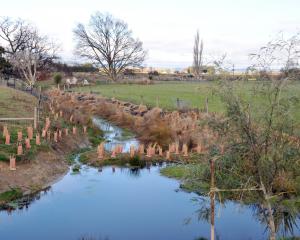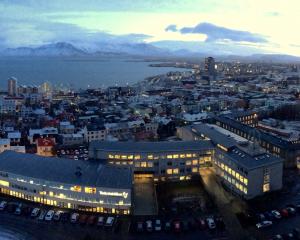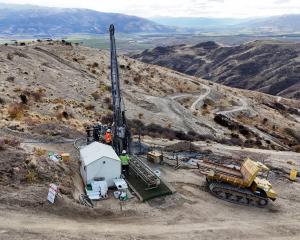How do you define a conflict of interest?, writes Gerrard Eckhoff.
The first Saturday in May is a perfect example of how the mutual interests of water users and recreational interests get together to enjoy a long-awaited event — duck shooting.
Urban-based duck hunters flock to their mai mais, often courtesy of the rural water user.
The very real urban/rural divide over water use is even temporarily set aside by Fish and Game, as their financial ‘‘interest’’ from duck-shooting licences is richly complemented by farmer-owned water storage dams and ponds.
It is a win-win situation for all, which regretfully is short-lived, as the scramble for water use continues at almost fever pitch, driving the competing factions apart.
We all have ‘‘interests’’ in water and its use to provide recreational, environmental and economic wellbeing to our various communities, yet the rural voices at the council table representing the hinterland are seemingly to be silenced (ODT February 14) due to perceived conflicts of interest by a number of councillors.
Councillors are required to declare any, and all, potential conflicts of interest they may have, but that does not necessarily mean such councillors cannot take part in debate and vote. Councillors are elected to represent their constituents and not their personal interests. The two are not mutually exclusive.
It would seem that allegations of some regional councillors having conflicts of interest around water has severely spooked the chairwoman of the Otago Regional Council (ORC), Marion Hobbs, who has sought an undisclosed (expensive) academic legal opinion on this matter.
There are three types of interest councillors seek to manage. Vested interests, conflicted interests and contingent interests.
A contingent interest is where councillors with (for example) strong environmental links and interests may seek to transfer away any existing use right in favour of those who expect the councillor(s) they voted for, to debate and vote to change that existing use right. Such councillors will have consistently followed a particular voting patten, regardless of the debate around social and economic impacts on existing use right holders.
It is entirely reasonable to suggest that those councillors, well known as staunch environmental advocates, also have a personal financial interest in seeking voter support for their particular stance. Their seat around the council table is worth about $45,000 a year to them. Their comments and vote then moves from a contingent interest, to a vested interest once the issue is settled.
A vested interest cannot be allocated to any councillor during the planning process, as a vested interest can only be claimed after the review of policy is complete.
Financial benefit may or may not occur at that point. In the case of the ORC, the whole of the water plan is up for review.
A vested interest therefore cannot be determined until the plan is notified, as a rural councillor who is also a water user, may receive partial continuance of an historical right or a loss of that right no greater or lesser than any other of the thousands of water users impacted by the final plan change.
A vested interest can also be seen as one to ensure political privilege and a populist standing among their particular constituency of either persuasion.
A conflict of interest generally applies in a legal sense where a lawyer cannot act for two conflicting interests. A councillor however is conflicted if their spouse/partner who (by way of an example) works for Fish and Game or Forest and Bird, contributes to debate and even votes on water issues.
It has been seen by past councils as reasonable for a well-functioning representative democracy to include such (conflicted) opinion. With the development of a water plan, a councillor must keep an open mind to so many competing interests to achieve an enduring and equitable solutions.
Banning water users from the council table is outrageously wrong as their personal understanding of an area and knowledge can often be far beyond urban councillors acceptance of staff recommendations.
It is important to note that the UK passed a Bill, Localism Act 2011, to allow ‘‘where an elected councillor who has given prior indications of a view of a matter is not to amount to predetermination.’’
That is the nub of the issue whether or not a councillor can keep an open mind despite having indicated a particular opinion and interest. If the voters want them on council, it is not up to the chair to decide otherwise by refusing to listen to rural voices — and not for the first time.
Water use and administration is of such crucial importance to us all — whether users of industrial quantities or not, users of bowling greens or golf courses, farms or council swimming pools, we must have our duly elected (rural) representatives being able to contribute to our representative democracy. If their exclusion persists, they must resign and stand again to be fully mandated by their constituency — again.
■ Gerrard Eckhoff is a retired Central Otago farmer and former Otago regional councillor and Act MP.
Comments
The political practices here in Dunedin is called Nepotism. Go to the New Zealand companies page and type in the mayor's name or any councilor's name and see what you get. Type in the Dunedin airport CEO's name and the people on Dunedin holdings board and see what you get. The people elected to local government mysteriously are on the boards of other entities held by the city of Dunedin. Conflict of interest? Also, surprise...surprise; they are paid...and the pay isn't that bad. So in essence, they are double-dipping. Do you really think they were the best-qualified applicants? Are they being paid for their expertise and experience or something else? Most of these people are dimmer than a refrigerator light bulb so I think its something else! If we had a real Newspaper here in Dunedin with real journalists, maybe investigate because that would make a great story. But the ministry of propaganda salutes the DCC smartly and churns out their version of the truth to the apathetic, uneducated masses. There is no oversight or accountability over our local Government officials & too much nepotism; any potential conflict of interest for any government employee means they must be excluded!
I seldom agree with Gerry Eckhoff, but this time I do. Conflict of interest (as opposed to pecuniary interest) is a hard line to draw and anything that shuts people (like water users) out of the public debate diminishes the quality of our governance.










